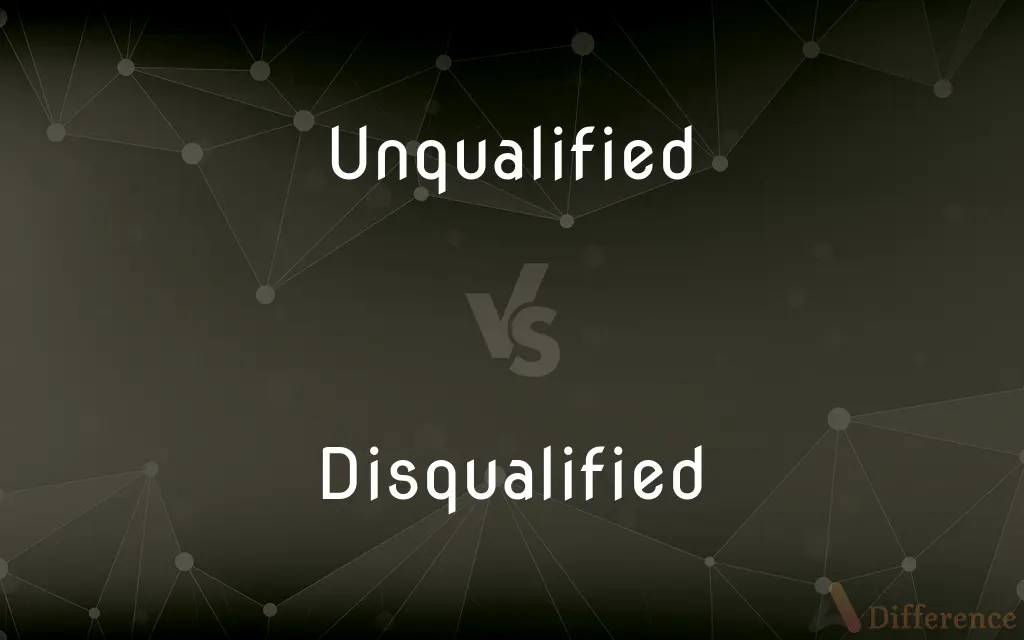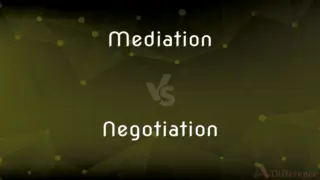Unqualified vs. Disqualified — What's the Difference?
By Fiza Rafique & Urooj Arif — Updated on April 20, 2024
Unqualified generally means lacking qualifications or skills, whereas disqualified refers to being officially barred from a competition or activity due to rules or misconduct.

Difference Between Unqualified and Disqualified
Table of Contents
ADVERTISEMENT
Key Differences
Unqualified often describes someone lacking the necessary skills, qualifications, or knowledge required for a specific role or task, whereas disqualified means someone has been removed or barred from a specific activity, usually due to failing to meet certain conditions or violations.
Unqualified can apply broadly across various professional and personal contexts, indicating a general lack of ability or credentials, on the other hand, disqualified is typically used in contexts like sports, legal proceedings, or competitions, highlighting an official decision based on specific criteria or infractions.
Unqualified has a more intrinsic connotation, suggesting an inherent absence of required traits or training, while disqualified focuses on external factors or decisions that remove one's eligibility or right to participate.
Unqualified does not imply any prior acceptance or participation before being deemed unsuitable, whereas disqualified often follows an initial acceptance or qualification that is later revoked.
Unqualified might be used subjectively and can vary based on the observer’s standards or expectations, on the other hand, disqualified is a clear, often legal or formal determination made by an authoritative body or set of rules.
ADVERTISEMENT
Comparison Chart
Definition
Lacking necessary skills or qualifications
Barred from an activity due to rules or issues
Usage Context
General, applies to abilities or credentials
Specific, often legal, sports, or professional
Connotation
Intrinsic lack of ability
External imposition of a penalty or restriction
Requirement of Action
No prior participation needed
Often follows some form of initial participation
Subjectivity
More subjective, based on observer's perspective
More objective, based on rules or violations
Compare with Definitions
Unqualified
Not modified or restricted by reservations.
She gave him unqualified support during the campaign.
Disqualified
Declared ineligible for an activity due to not meeting legal or other requirements.
The athlete was disqualified for failing a drug test.
Unqualified
Lacking the necessary skills or qualifications.
He was unqualified for the job, lacking both experience and education.
Disqualified
Removed from a position or privilege.
He was disqualified from holding any corporate office.
Unqualified
Absolute; complete.
His statement was an unqualified denial.
Disqualified
Prevented from proceeding due to a violation.
The candidate was disqualified due to election fraud.
Unqualified
Without fulfilling required conditions.
Their proposal was unqualified for consideration under the new regulations.
Disqualified
Made unfit or ineligible for something.
His previous convictions disqualified him from applying for the position.
Unqualified
Not competent or sufficiently knowledgeable.
They were unqualified to lead the research due to insufficient expertise.
Disqualified
Barred from a competition or election.
She was disqualified from the race after a false start.
Unqualified
Lacking the proper or required qualifications
Unqualified for the job.
Disqualified
To render unqualified or unfit.
Unqualified
Not modified by conditions or reservations; absolute
An unqualified refusal.
Disqualified
To declare unqualified or ineligible.
Unqualified
Not qualified, ineligible, unfit for a position or task.
His lack of a high school diploma renders him unqualified for the job.
Disqualified
To deprive of legal rights, powers, or privileges.
Unqualified
Not elaborated upon, or not accompanied by restrictions or qualification; undescribed.
Her cooking ability, while mentioned, was unqualified by her.
Disqualified
Simple past tense and past participle of disqualify
Unqualified
Outright; thorough; utter.
Disqualified
Rendered ineligible by law or rule or provision; as, disqualified from voting.
Unqualified
Not limited or restricted;
An unqualified denial
Disqualified
Barred from competition for violation of rules; as, a disqualified player.
Unqualified
Not meeting the proper standards and requirements and training
Disqualified
Disqualified by law or rule or provision
Unqualified
Having no right or entitlement;
A distinction to which he was unentitled
Disqualified
Barred from competition for violation of rules;
A disqualified player
Unqualified
Lacking specific legal qualifications;
A wife is usually considered unqualified to testify against her husband
Unqualified
Lacking the necessary skill or knowledge etc.;
An incapable helper
Common Curiosities
How does one determine if someone is unqualified?
Determining if someone is unqualified typically involves assessing their skills, knowledge, and credentials against the requirements of a particular role or task.
What are common reasons for disqualification?
Common reasons for disqualification include failing to meet set rules or standards, misconduct, rule violations, or legal barriers.
What does it mean to be unqualified?
Being unqualified means lacking the necessary skills, knowledge, or qualifications required for a particular role or task.
What does disqualified mean in a legal context?
In a legal context, disqualified refers to being declared ineligible to participate in a process or activity due to legal reasons or rule infractions.
Can someone be both unqualified and disqualified?
Yes, someone can be both unqualified and disqualified if they lack the necessary qualifications and are also officially barred from participation due to specific rules or violations.
Can an unqualified person become qualified?
Yes, an unqualified person can become qualified through education, training, and gaining relevant experience in the field of interest.
What happens when someone is disqualified from a competition?
When someone is disqualified from a competition, they are officially barred from participating further due to violations of the rules or other specific criteria set by the organizers.
What roles do ethics play in disqualification?
Ethics play a crucial role in disqualification, especially in cases involving misconduct or unethical behavior, which can lead to being barred from professional practices or competitions.
What are the implications of being unqualified for a job?
Being unqualified for a job implies that a person does not possess the necessary skills, qualifications, or experience required to perform the job effectively.
Is disqualification always permanent?
Disqualification is not always permanent; the duration and terms depend on the rules of the specific context, such as a competition or legal stipulation.
Can disqualification affect one’s reputation?
Yes, disqualification can adversely affect one's reputation, especially if it stems from unethical behavior or cheating, potentially leading to long-term consequences in one’s personal and professional life.
How does being unqualified affect career progression?
Being unqualified can significantly hinder career progression, limiting opportunities for advancement until relevant qualifications or skills are acquired.
Share Your Discovery

Previous Comparison
Osteoclast vs. Osteoblast
Next Comparison
Mediation vs. NegotiationAuthor Spotlight
Written by
Fiza RafiqueFiza Rafique is a skilled content writer at AskDifference.com, where she meticulously refines and enhances written pieces. Drawing from her vast editorial expertise, Fiza ensures clarity, accuracy, and precision in every article. Passionate about language, she continually seeks to elevate the quality of content for readers worldwide.
Co-written by
Urooj ArifUrooj is a skilled content writer at Ask Difference, known for her exceptional ability to simplify complex topics into engaging and informative content. With a passion for research and a flair for clear, concise writing, she consistently delivers articles that resonate with our diverse audience.
















































